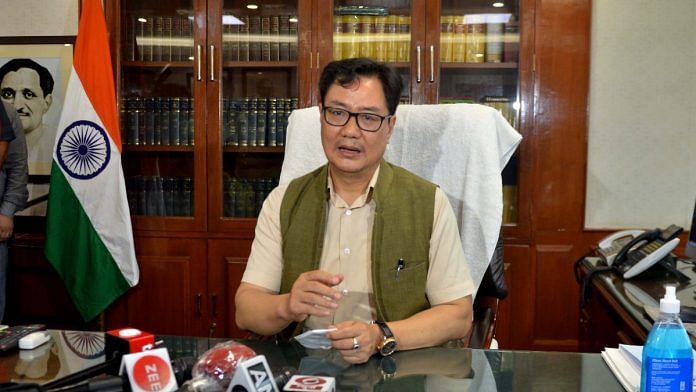New Delhi: Union Minister of Law and Justice Kiren Rijiju said Friday that he was “very upset” with the Supreme Court’s decision to suspend the sedition law earlier this year. Speaking at the India Today Conclave in Mumbai, he also criticised the collegium system, terming it “opaque” and said the Centre is looking to tackle the issue of high case pendency.
“We told the Supreme Court that the government is thinking about changing the provision of the sedition law. Despite that, the Supreme Court struck down the provisions of the law. I was very upset about it,” said the minister.
In May, a three-judge bench of the apex court put the sedition law in abeyance, thereby putting on hold all pending trials, appeals and proceedings — with respect to charges under section 124A of the Indian Penal Code (IPC) — until the Centre completes its review of the provision.
Rijiju, however, claimed that the order was issued despite the central government stating its intent to review the sedition law earlier. He further added, “There is a Lakshman Rekha for everybody. Let us not cross the Lakshman Rekha in the interest of the nation.”
In 2015, the top court struck down the National Judicial Appointments Commission Act (2014) as ‘unconstitutional and void’, and upheld the existing collegium system for selection of judicial officers.
The proposed NJAC would have consisted of six individuals: the Chief Justice of India, two senior most judges of the Supreme Court, the Law minister and two “eminent persons”.
The five-judge Constitution Bench of the apex court struck down the act without offering “a better option”, said Rijiju.
“I am not satisfied with the present (collegium) system. A majority of judges agree with me because what I’m saying is a fact. I’m not saying anything that is contrary to their beliefs and understanding,” he added.
Rijiju proposed that both the government and the judiciary should offer names, just as the NJAC envisioned.
Further, he said that the government did not immediately react to the top court’s order in 2015, but that it wouldn’t be “silent forever”. He, however, clarified that the central government is not in favour of entering into a “confrontation” with the judiciary.
Also Read: SC orders cops & state govts to take ‘suo motu’ action against hate speech, or face contempt
‘Politics’ in collegium, case pendency
While addressing the conclave in Mumbai, the Law minister compared “politics” within the collegium system to the kind practised by politicians.
“The politics that we politicians do is nothing in front of the politics in the judiciary. It is not visible, but there is intense politics there. So, you tell me, should judges spend more time delivering justice to the people or more time in administrative processes,” he asked.
Referring to the 4.9 crore cases currently pending before the Supreme Court, Rijiju said access to justice in India is a “Herculean task” and case pendency is a major issue.
Asked whether the central government — who former CJI N.V. Ramana termed the “biggest litigant” in India — can bring down the overall case pendency, he said the government is looking into the matter and holding consultations on how to reduce the number of cases it files.
“Inter-ministerial consultations are happening at much faster intervals. We have also passed certain directions. For example, for the Finance ministry, similar cases should not be appealed. We are very clear that the government being a party to almost half of the pending cases, I think that should also come down,” he said.
Rijiju also suggested that the judiciary may have, at times, overstepped. “Judges should be confined to what is expected of them,” he said, adding that judges should also refrain from making “unnecessary” comments and observations when delivering judgments.
(Edited by Amrtansh Arora)
Also Read: ‘Eliminates black money from political funding’: Modi govt defends electoral bond scheme in SC



